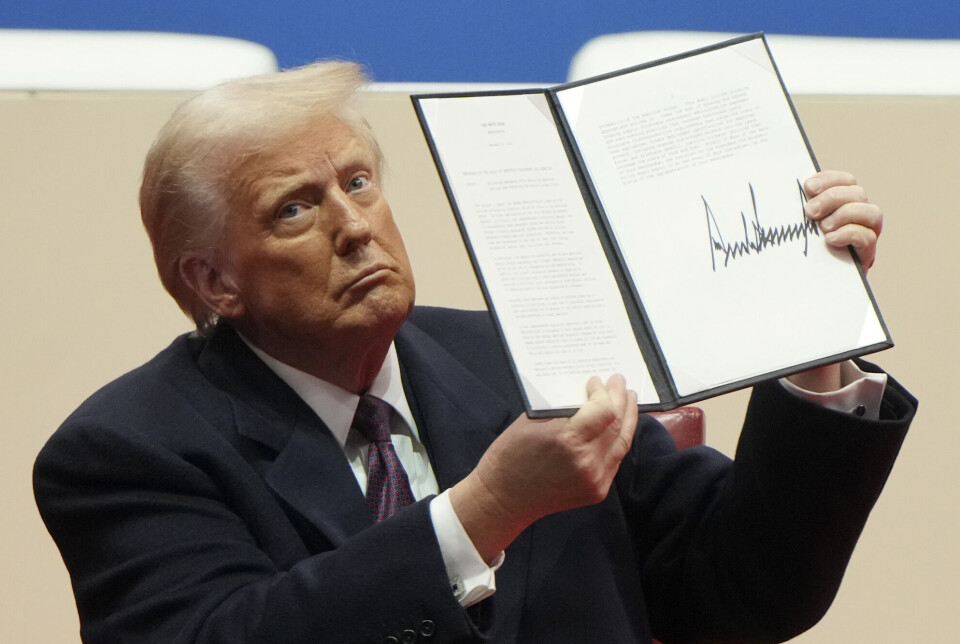Climate experts: Reduced U.S. climate commitment could influence Europe
The U.S. withdrawal from the Paris Agreement could lead to weaker global efforts to cut emissions, which may influnece European countries, according to two climate experts.

"The Paris Agreement was successful largely because of the bilateral cooperation between China and the USA, the two countries with the highest emissions in the world. A lot depends on this. So when one of them pulls out, it's clearly problematic," Endre Tvinnereim tells NTB.
He is a professor at the University of Bergen and teaches climate policy.
"This is a major setback for international climate cooperation," he says.
USA's climate exit
On his first day in office, Donald Trump promised to withdraw the U.S. from the Paris Agreement, which forms the basis for international efforts to reduce greenhouse gas emissions.
At the same time, he declared a national energy crisis and opened up for more oil and gas drilling. Additionally, Trump revoked an executive order aimed at accelerating the transition to electric vehicles.
In other words: Climate policy is not high on Trump's priority list as he leads the world's largest economy for the next four years.
Impact on Europe
This could also influence several European countries, believes Gunnar Eskeland. He is a professor of economics at the NHH Norwegian School of Economics and specialises in climate and energy issues.
"For Europe, a key concern has always been: What if other regions, like the U.S., don't follow through? I believe Europe will maintain its focus on reducing emissions, but there’s a real risk that the U.S. decision could have a contagion effect, particularly in Eastern Europe,” he tells NTB.
Most viewed
Eskeland points out that while the U.S.’s climate efforts were never particularly ambitious, they were still crucial in shaping global climate action. He believes that the EU's position in global climate negotiations could be weakened if the U.S. signals that they no longer care.
“The willingness of European nations to lead by example, inspire, and advocate for climate action could diminish if the U.S. disengages. These effects will unfold over time, possibly over two to six years,” says Eskeland.
With U.S. midterm elections coming next year, there is a possibility that the Democrats could regain control of Congress. And in four years, Trump's presidency will be over.
"So part of the uncertainty revolves around what Trump will actually be able to accomplish," he says.
Biden's strategy
Professor Tvinnereim suggests that undoing President Joe Biden’s climate initiatives – particularly renewable energy subsidies – may not be straightforward. However, he acknowledges that Trump’s return to power could weaken global climate momentum.
"Those in Europe who question why we should care about the climate when the U.S. does not will likely gain traction from this," he says.
Despite Trump’s stance, Biden’s Inflation Reduction Act (IRA) has driven job creation in both Democratic and Republican-led states. The law includes significant subsidies for renewable energy, which the professor notes may be challenging for Trump to dismantle.
"Biden achieved a lot as president, but he hasn't been great at communicating it. His approach with the IRA was to incentivise the renewable industry by offering subsidies. Reversing these measures could prove difficult, particularly in Republican strongholds,” he says.
"Regrettable"
Norwegian Minister of Climate and the Environment Andreas Bjelland Eriksen (Labour Party) describes Trump’s decision as a serious setback for global climate cooperation.
"We live in a world that needs more cooperation, not less – especially on global challenges like climate change. It's therefore regrettable that the U.S. is withdrawing from the Paris Agreement," he says.
Eriksen assures that Norway will continue to support climate initiatives in the U.S., regardless of the country’s official stance on the Paris Agreement.
Meanwhile, Arild Hermstad, leader of the Green Party, argues that the Norwegian government must be even clearer in its climate policies and calls for Norway's climate cooperation with the EU to be extended.
"We should reopen the discussion on Norwegian EU membership. I also hope Eriksen sees that when the USA does less, we must do more," he says.
———
Translated by Alette Bjordal Gjellesvik
Read the Norwegian version of this article on forskning.no
Related content:

Subscribe to our newsletter
The latest news from Science Norway, sent twice a week and completely free.





































